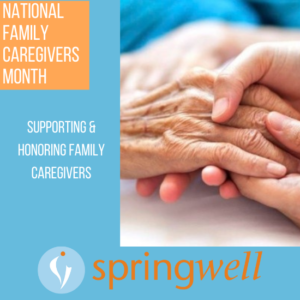Nov 9
Caregivers Support Each Other and Discuss Anticipatory Grief

Providing or arranging for the care of someone else, can be complicated logistically, physically, and emotionally. Caregivers benefit from support that helps them make informed decisions, solve problems, reduce stress, and maintain overall physical and emotional health. As part of that assistance, Springwell’s Caregiver Support Program periodically offers events for caregivers.
Recently, the Springwell Caregiver Support Program and Cathy LeClerc, LICSW of Good Shepherd Community Care hosted a virtual gathering for caregivers to discuss anticipatory grief which is a response to an impending loss. The impending loss may be due to extended illness, terminal illness or general aging and decline. Both the caregiver and person receiving care are affected. Grief is the universal natural way that we cope with loss, yet it is very personal and can be different for everyone.
“Anticipatory grief is multifaceted. There was a time when you weren’t a caregiver,” noted LeClerc. “You had a different relationship with the person you are now caring for. The change might be sudden or gradual. You might be losing what you thought your future would be with that person because now you are caring for them. Any response is okay. There is no right or wrong way, no way you should feel or shouldn’t feel. It is important to acknowledge your feelings to yourself, whether they are anger or sadness. Pay attention to those feelings- don’t push them aside or they could come out in a negative way such as resentment.”
Responses to anticipatory grief can be physical and emotional. Physical responses may include problems with sleeping, aches, pains, eating too much or too little or you might have trouble concentrating. Emotional responses can run the gamut from sadness, anger, frustration, to resentment. “It is not easy taking care of someone no matter how well-meaning we are. We can have a bad day. We are human,” shares LeClerc.
Finding ways of coping with anticipatory grief can be helpful. Some people benefit from talking with other caregivers in a support group. One caregiver shared that she is part of two support groups and that it is “a wonderful experience” and she has formed a bond with the other caregivers that is so helpful. (For assistance in finding a caregiver support group, contact Springwell at inforef@Springwell.com or 617-926-4100.) Others find keeping a journal allow them to release their feelings. LeClerc also suggested that caregivers may enjoy a hobby such as painting, reading, yoga or quilting that gives them a little time for themselves.
There are multiple stages of loss for both caregivers and their loved ones. The group gathered in this meeting agreed that sharing with other caregivers helped them to know that they are not alone. Please contact Springwell (inforef@Springwell.com or 617-926-4100) if you would like support or resources as a caregiver.


